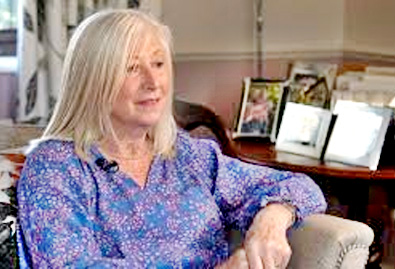DE Online Desk
Linda Kelly, 67, has advanced breast cancer which has spread to her bones and chest wall, but says a new pill has given her extra years of life and time to travel with her husband.
“It does let you have a normal kind of life and you forget you have cancer,” she says of the new drug capivasertib, which has been recommended for NHS use in England and Wales, and is funded from today in England.
Linda is one of more than 1,000 women with incurable breast cancer who could benefit from the drug, which can slow progression of the disease.
It’s another possible treatment option for those with this cancer but a charity said breast cancer drugs should be approved more quickly.
Linda is a keen gardener who keeps active by cycling 60 miles a week and also does pilates.
She says she’s had “fantastic” results from the new drug, which she takes twice daily in tablet form.
The side-effects for her were minimal and it’s allowed her to go on holiday to New Zealand with her husband Neil last year and plan a trip to the US this year.
“You feel the drug is working and you can be a lot calmer – it’s given me nearly four years of extra time,” she says.
She says the drug has also given her hope.
“It does make you think about your life, and what you want to do with your life in the future – but at least you feel well enough to make those plans and confident enough as well to fulfil some of those plans.”
But not everyone is likely to have such positive results from the drug.
In trials, in 708 women, when combined with hormone therapy, the drug doubled the time the cancer took to grow, from 3.6 months to 7.3 months, and shrank tumours in 23% of patients.
“It presents a very effective option that can work for a long time – many months, and in some people it can be years,” said Prof Nick Turner, lead researcher and professor of medical oncology at the Institute of Cancer Research and The Royal Marsden.
“It can substantially delay chemotherapy which many women fear because of the side-effects,” he added.
“Advanced breast cancer is highly treatable and we want kinder, better treatments.”
National Institute for Health and Care Excellence (NICE) approved the drug.
They will fund the drug through the Cancer Drugs Fund in England but funding has not yet been confirmed in Wales.
Breast cancer is the most common cancer in the UK, with one in seven women affected in their lifetimes and 75% surviving for 10 years or more after diagnosis.
If the cancer returns and spreads to other parts of the body, treatments aim to control it, reduce the symptoms and improve quality of life.
Possible treatments include chemotherapy, radiotherapy and drugs that help to stop the cancer growing – either by blocking hormones, boosting the body’s immune system or targeting what makes cancer cells grow.
This new drug capivasertib is a targeted therapy. It works in a new way, blocking the activity of a protein molecule called AKT which drives cancer growth.
Scientists started working on the drug’s development 20 years ago and say it’s the most effective cancer drug they’ve seen for advanced cancer. AstraZeneca is the manufacturer of capivasertib.
Genetic testing
The drug is suitable for those with certain gene mutations that affect up to half of people with hormone receptor positive secondary breast cancer – the most common type, which grows in the presence of oestrogen.
Prof Peter Johnson, clinical director for cancer at NHS England, said it offered “an additional option” for some whose cancer has progressed despite previous hormone therapy – but it wouldn’t be suitable for everyone.
Claire Rowney, chief executive at charity Breast Cancer Now, said she was “delighted” that the drug would offer some people “the hope of more precious time to do what matters most to them”.
But she said patients had “faced unnecessary delays in accessing it” after NICE rejected the drug initially, and they should approve breast cancer drugs more quickly for those who need them.
“NHS England must now put in place prompt genetic testing to ensure those eligible receive capivasertib without further delay,” she said, adding that Scotland should also consider funding the treatment quickly so that patients across the UK would have access.
Speaking on BBC Radio 4’s Today programme, Prof Johnson said NICE had to work through the evidence when approving new drugs for the NHS, and those discussions included how much the drug will cost.
“We have to make sure the treatments we bring in are good value for money for the NHS and come in under the cost threshold that we expect because obviously, particularly in these hard times,” said Prof Johnson.
He also said, “Money is not plentiful and we need to make sure that the price of the drug and the way we use money really do constitute… good value for money for the NHS,”
NICE says it has approved 24 out of 25 breast cancer treatments it has assessed over the past seven years.

